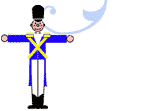|
Maria Montessori was born in Italy in 1870. Unlike
most women of her day, she studied mathematics, physics and natural science. She planned to become an engineer. She became
so interested in biology, she decided to study medicine. Medical school was a constant struggle, but in 1896, ranking in the
top of her class, she became the first woman to graduate from the University School of Medicine. She became interested in
children left to waste away in mental institutions. She began to work with these children, and eventually they were able to
pass the State Elementary School Exams. It was said she had performed a miracle! Dr. Montessori felt this was certainly no
miracle. If these children were capable of attaining this level of achievement, what then would be the level of work that
healthy and normal children could achieve if given the proper environment? So began her years of work and study with normal
children which evolved into the philosophy of education now called the Montessori Method.
The Montessori Method is
not a method of education as such, but an integral way of life. There is no formal dogma or theory. The fundamental concept
is that children have a passionate love of learning, of work, of order and self-discipline, all of which can become permanent,
self-enforcing traits if the child is properly encouraged. All of the ideas of Dr. Montessori were a result of her direct
observation of children themselves.
The special materials used in the Montessori schools were developed in her attempt
to fill the needs of children as she saw and interpreted them. She also discovered that in the development of the child, there
are what she called sensitive periods. At various fairly predictable ages, children pass through periods of sensitivity to
such things as order and courtesy, touch, language, mathematics, dimension, etc. By combining a knowledge of these periods
and a judicious use of the apparatus, Montessori schools have introduced to very young children vast areas of knowledge usually
believed unavailable to them.
The children are free to make these achievements because they are given an environment
established and geared to their needs. This is what Montessori meant by the prepared environment. All the apparatus is housed
on low shelves, within easy reach. The only restrictions upon the use
of the apparatus are that it must be properly used,
not abused, and must be returned to its right place after use. Most materials have a control of error built in so that the
child can correct him or herself without the aid of an adult. The tables and chairs are all lightweight so that they are easily
overturned by the children, thus encouraging grace of movement and care of the environment.
The children learn to take
great pride in caring for their environment themselves, and being responsible for it. With a place for everything and everything
in its place, the child becomes part of an ordered environment.
Montessori found order to be an integral part of liberty.
The concept of liberty in the Montessori school is often misunderstood. While liberty is essential for the children, it must
never be allowed to become license. It is a point of arrival rather than a point of departure. The children are made to understand
what they must not do. But because they are free, they learn to make choices. The order of progression is from controlled
freedom to concentration to self discipline. The child works, not to know, but to grow.
|




